Share your results
Please enter your email
Results shared!
We've sent a link to your email so you can access your results at any time.
Here are some guidelines on exercise for older people, including what type, how much, and how to get started.
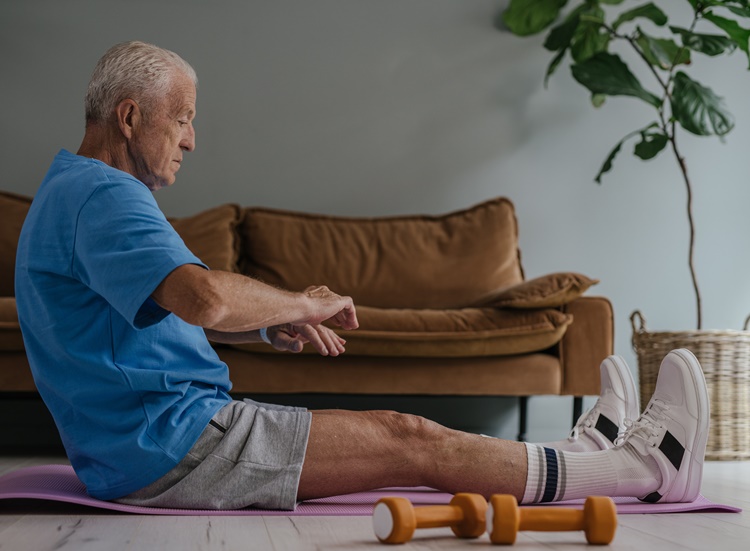
Exercise is an important part of taking control of your ageing. In fact, regular exercise helps keep you independent for as long as possible. That's the definition of healthy ageing.
The Department of Health recommends 30 minutes of moderate-intensity exercise every day, or most days. Alternatively, the ACSM guidelines for physical activity recommend 2.5-5 hours spread throughout the week. For example, this could look like 3 sessions of an hour each week. The truth is that any amount of exercise is better than none.
But what can moderate-intensity exercise actually do for you? What could it look like for you? And how can you make it part of your daily routine?
Exercise is an important part of taking control of your ageing. In fact, regular exercise helps keep you independent for as long as possible. That's the definition of healthy ageing.
The Department of Health recommends 30 minutes of moderate-intensity exercise every day, or most days. Alternatively, the ACSM guidelines for physical activity recommend 2.5-5 hours spread throughout the week. For example, this could look like 3 sessions of an hour each week. The truth is that any amount of exercise is better than none.
But what can moderate-intensity exercise actually do for you? What could it look like for you? And how can you make it part of your daily routine?
Read less...
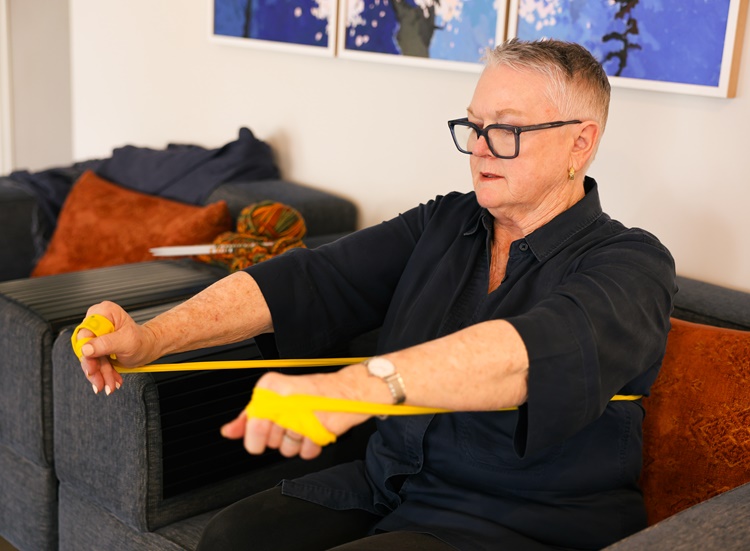
Exercise can help with many age-related health issues. This includes the management of osteoporosis, osteoarthritis, high blood pressure, and type 2 diabetes. It improves your balance and prevents your risk of falls. And it's good for your brain and makes learning new things easier.
People who exercise regularly tend to fall asleep faster and stay asleep for longer. And they report better quality sleep. And good sleep is an important factor to your health and peace of mind. Here are some more tips for a better night's sleep.
Exercise is also a great way to boost your mood and reduce stress. Stress has a way of affecting your physical health. It can even shut down your immune system. So, part of looking after your physical health includes taking care of your mental health as well. You can check out 5 more tips for reducing stress here.
Exercise can help with many age-related health issues. This includes the management of osteoporosis, osteoarthritis, high blood pressure, and type 2 diabetes. It improves your balance and prevents your risk of falls. And it's good for your brain and makes learning new things easier.
People who exercise regularly tend to fall asleep faster and stay asleep for longer. And they report better quality sleep. And good sleep is an important factor to your health and peace of mind. Here are some more tips for a better night's sleep.
Exercise is also a great way to boost your mood and reduce stress. Stress has a way of affecting your physical health. It can even shut down your immune system. So, part of looking after your physical health includes taking care of your mental health as well. You can check out 5 more tips for reducing stress here.
Read less...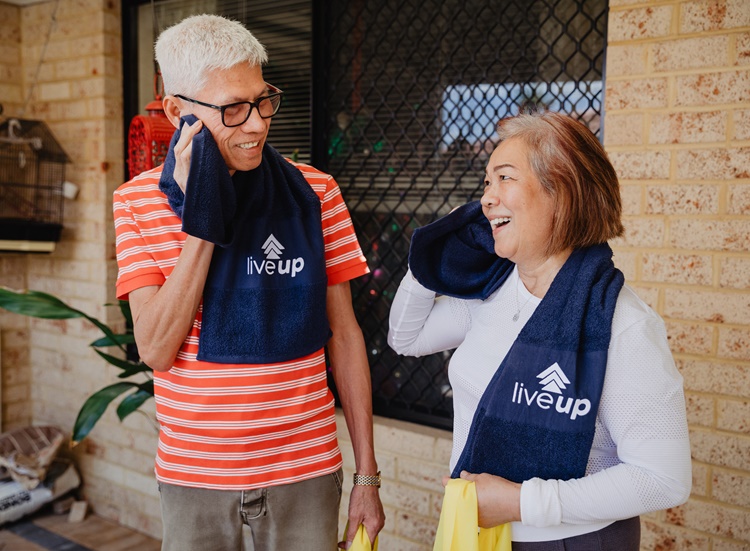
Get started with whatever you can. Begin with easy exercises for 10 minutes a day, if you need. You can increase your intensity and duration as you feel able.
A good way to tell the intensity level of an exercise is the talk test. If you can talk comfortably while you do the exercise, but aren't able to sing while moving, it's of moderate intensity. If you can talk and sing easily, it's low intensity. If you can do neither, it's high intensity.
You can peruse LiveUp’s printable exercise sheets for ideas and easy steps to follow. These are at the top of the healthy ageing articles page in the healthy ageing resources tab. And here are 10 tips for creating healthy habits to help you keep up with your new exercise goals.
Get started with whatever you can. Begin with easy exercises for 10 minutes a day, if you need. You can increase your intensity and duration as you feel able.
A good way to tell the intensity level of an exercise is the talk test. If you can talk comfortably while you do the exercise, but aren't able to sing while moving, it's of moderate intensity. If you can talk and sing easily, it's low intensity. If you can do neither, it's high intensity.
You can peruse LiveUp’s printable exercise sheets for ideas and easy steps to follow. These are at the top of the healthy ageing articles page in the healthy ageing resources tab. And here are 10 tips for creating healthy habits to help you keep up with your new exercise goals.
Read less...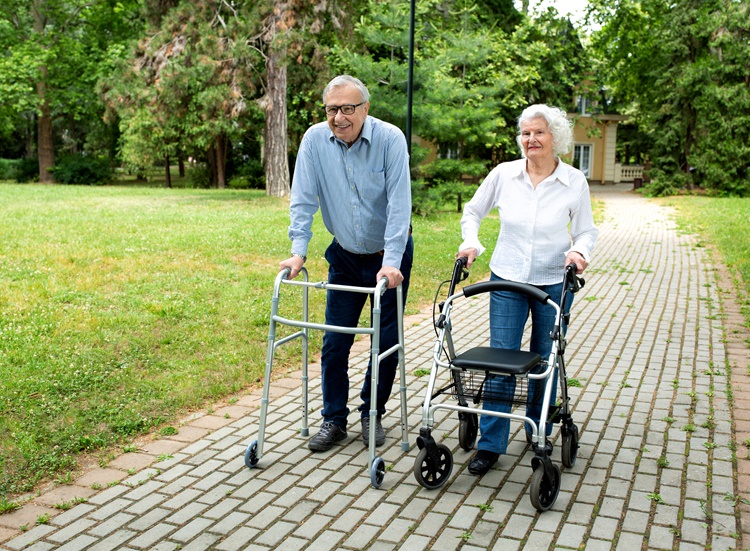
Use aids if you need them to keep mobile. A walking aid, for example, might allow you to keep moving for as long as possible. And the only way to improve your fitness is to keep moving.
Using dressing aids or assistive products in the kitchen and other areas could help you. Doing tasks around the house for yourself is a good way to keep active and able as you age. Some simple low-cost assistive technology could help you stay independent for longer.Use aids if you need them to keep mobile. A walking aid, for example, might allow you to keep moving for as long as possible. And the only way to improve your fitness is to keep moving.
Using dressing aids or assistive products in the kitchen and other areas could help you. Doing tasks around the house for yourself is a good way to keep active and able as you age. Some simple low-cost assistive technology could help you stay independent for longer. Read less...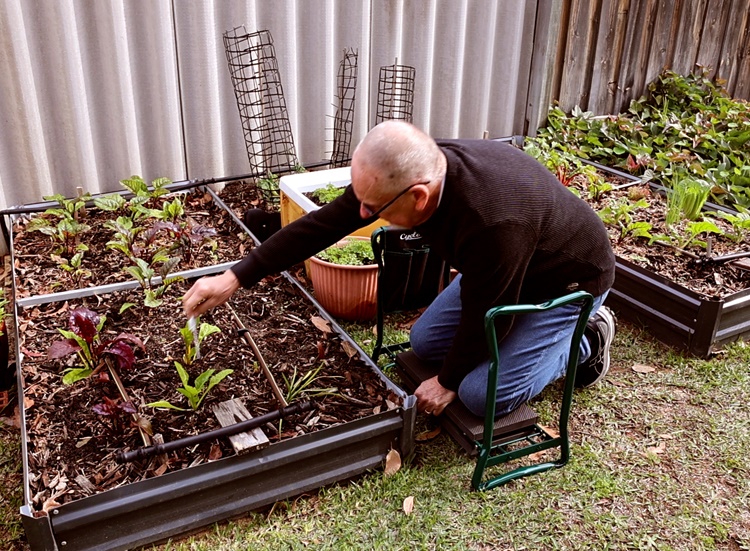
1. Go for walks
You could take a brisk walk through the neighbourhood or try a hiking trail with friends. You could also play golf and opt for walking between holes, rather than using the golf cart. Learn more about walking for healthy ageing.
2. Do some gardening
Some garden work could be a good source of cardio, stretching, and gentle strength training. Learn more about gardening for healthy ageing. In the same vein, you could do housework or wash the car. But gardening has the added mental health benefit of combining greenery with sunshine.
1. Go for walks
You could take a brisk walk through the neighbourhood or try a hiking trail with friends. You could also play golf and opt for walking between holes, rather than using the golf cart. Learn more about walking for healthy ageing.
2. Do some gardening
Some garden work could be a good source of cardio, stretching, and gentle strength training. Learn more about gardening for healthy ageing. In the same vein, you could do housework or wash the car. But gardening has the added mental health benefit of combining greenery with sunshine.
Read less...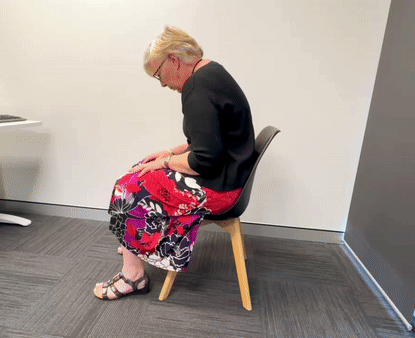
3. Chair yoga
Chair yoga is a low-cost, low-impact way to improve your mobility, strength, and balance. And it makes you feel great. To get started, you can follow this exercise sheet of 10 chair yoga poses to try at home.
4. Tai Chi
Tai Chi is also low impact, low cost, and high reward. It's mostly performed in a semi-squatting position, with slow and careful movements. It practices your posture control, trunk rotation, weight transfer and strength. And it's been found to successfully decrease the rate of falls in older people.
3. Chair yoga
Chair yoga is a low-cost, low-impact way to improve your mobility, strength, and balance. And it makes you feel great. To get started, you can follow this exercise sheet of 10 chair yoga poses to try at home.
4. Tai Chi
Tai Chi is also low impact, low cost, and high reward. It's mostly performed in a semi-squatting position, with slow and careful movements. It practices your posture control, trunk rotation, weight transfer and strength. And it's been found to successfully decrease the rate of falls in older people.
Read less...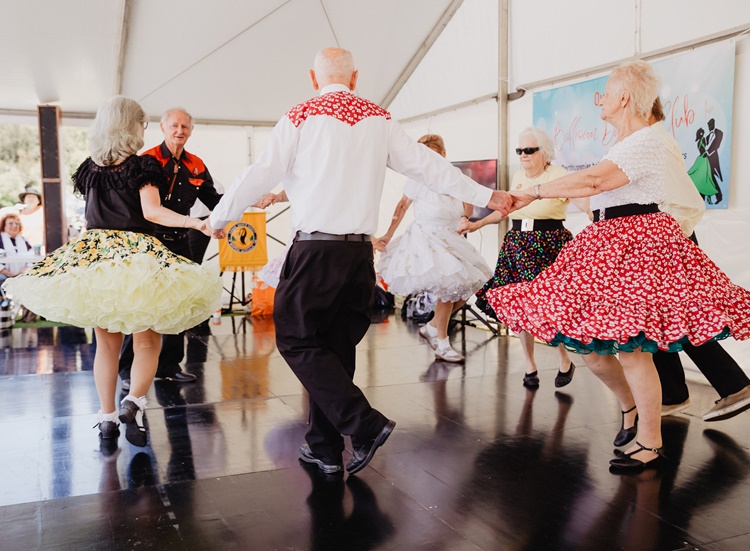
5. Water aerobics
Moving in water is easy on the joints and rewarding to the muscles. In fact, water exercises have physical and cognitive, as well as psychological benefits for older people. Improve your coordination, balance, strength, and mobility in a safe environment. It's also good for heart health, weight loss, and in managing arthritis or injuries. Start your aqua fitness journey by finding a local water aerobics class.
6. Dance classes
Dancing helps with fitness, strength, flexibility, joint health, balance, and coordination. It's also associated with reduced risk of dementia. Styles that involve improvisation and creativity are especially good for the brain.
5. Water aerobics
Moving in water is easy on the joints and rewarding to the muscles. In fact, water exercises have physical and cognitive, as well as psychological benefits for older people. Improve your coordination, balance, strength, and mobility in a safe environment. It's also good for heart health, weight loss, and in managing arthritis or injuries. Start your aqua fitness journey by finding a local water aerobics class.
6. Dance classes
Dancing helps with fitness, strength, flexibility, joint health, balance, and coordination. It's also associated with reduced risk of dementia. Styles that involve improvisation and creativity are especially good for the brain.
Read less....tmb-large%20card.png?sfvrsn=e721f6b2_0)
While these activities can mostly be done at home or on your own, you may benefit from doing them in group settings.
Join a walking group or community garden. It could add socialisation to your daily physical activities. A class setting can help guide you through activities like chair yoga and Tai Chi. And of course, water aerobics and dance classes are safest (and more fun) with friends!
There are many ways you can use physical activity to keep connected with your community.
While these activities can mostly be done at home or on your own, you may benefit from doing them in group settings.
Join a walking group or community garden. It could add socialisation to your daily physical activities. A class setting can help guide you through activities like chair yoga and Tai Chi. And of course, water aerobics and dance classes are safest (and more fun) with friends!
There are many ways you can use physical activity to keep connected with your community.
Read less....tmb-large%20card.png?sfvrsn=fb8461f9_0)
When exercising, you may need to drink more water than usual. Here are some tips on staying hydrated.
You can also make exercise easier by eating well. A good diet will keep you nourished and give you the energy you need to get moving. Here are some tips on eating for good health.
When exercising, you may need to drink more water than usual. Here are some tips on staying hydrated.
You can also make exercise easier by eating well. A good diet will keep you nourished and give you the energy you need to get moving. Here are some tips on eating for good health.
Read less....tmb-large%20card.png?sfvrsn=e66329ad_2)
It’s never too late to get started. If you need more information, take the LiveUp quiz by clicking the 'Let's go!' button below or get in touch with one of our helpful navigators on 1800 951 971.
Click on the links below for more detailed information:
Department of Health Guidelines
Read more of our healthy ageing articles HERE
It’s never too late to get started. If you need more information, take the LiveUp quiz by clicking the 'Let's go!' button below or get in touch with one of our helpful navigators on 1800 951 971.
Click on the links below for more detailed information:
Department of Health Guidelines
Read more of our healthy ageing articles HERE
Read less...Australian Government Department of Health. (May 2021). Physical activity and exercise guidelines for older Australians (65 years and over). https://www.health.gov.au/topics/physical-activity-and-exercise/physical-activity-and-exercise-guidelines-for-all-australians/for-older-australians-65-years-and-over
Farinha, C., Teixeira, A. M., Serrano, J., Santos, H., Campos, M. J., Oliveiros, B., Silva, F. M., Cascante-Rusenhack, M., Luís, P., & Ferreira, J. P. (2021). Impact of Different Aquatic Exercise Programs on Body Composition, Functional Fitness and Cognitive Function of Non-Institutionalized Elderly Adults: A Randomized Controlled Trial. International journal of environmental research and public health, 18(17), 8963. https://doi.org/10.3390/ijerph18178963
U.S. Department of Health and Human Services. (2018). Physical activity guidelines for Americans (2nd ed.). https://odphp.health.gov/sites/default/files/2019-09/Physical_Activity_Guidelines_2nd_edition.pdf?utm_source=Spinal%20Decompression%20Surgery%20list&utm_medium=inline-CTA-laminoplasty-specialist&utm_campaign=Conditions%20to%20physicians
Verghese, J., Lipton, R. B., Katz, M. J., Hall, C. B., Derby, C. A., Kuslansky, G., Ambrose, A. F., Sliwinski, M., & Buschke, H. (2003). Leisure activities and the risk of dementia in the elderly. The New England Journal of Medicine, 348(25), 2508-2516. https://doi.org/10.1056/NEJMoa022252
Yoo, J.-H. (2020). The psychological effects of water-based exercise in older adults: An integrative review. Geriatric Nursing, 41(1), 45-53. https://doi.org/10.1016/j.gerinurse.2020.04.019
Take our easy OpenUp quiz to get personalised advice and see suggested products, services and support in your local area or online.
Let's go!